Sir John Monash, Personal Files Book 16, 1 August - 3 September 1917, Part 1
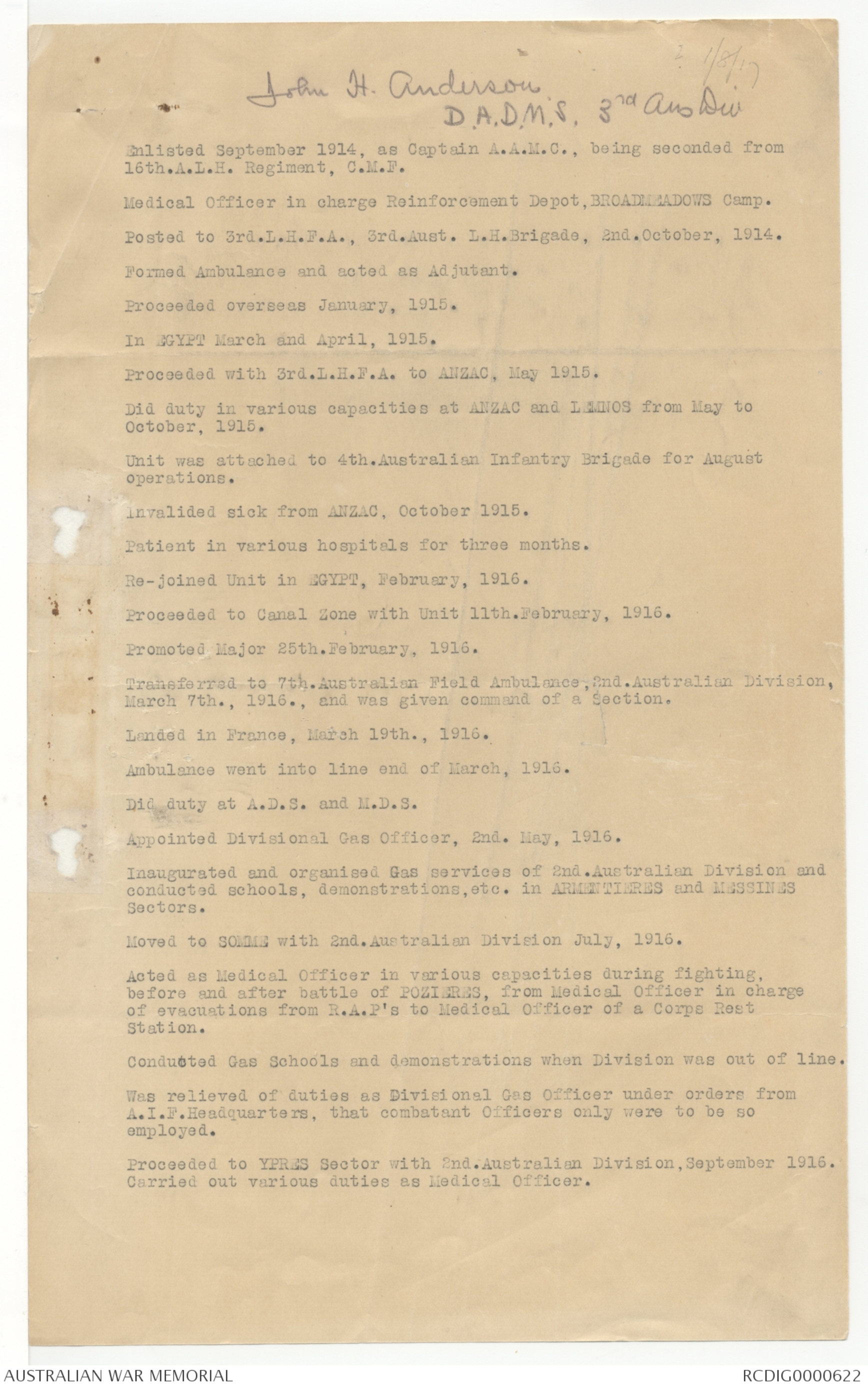
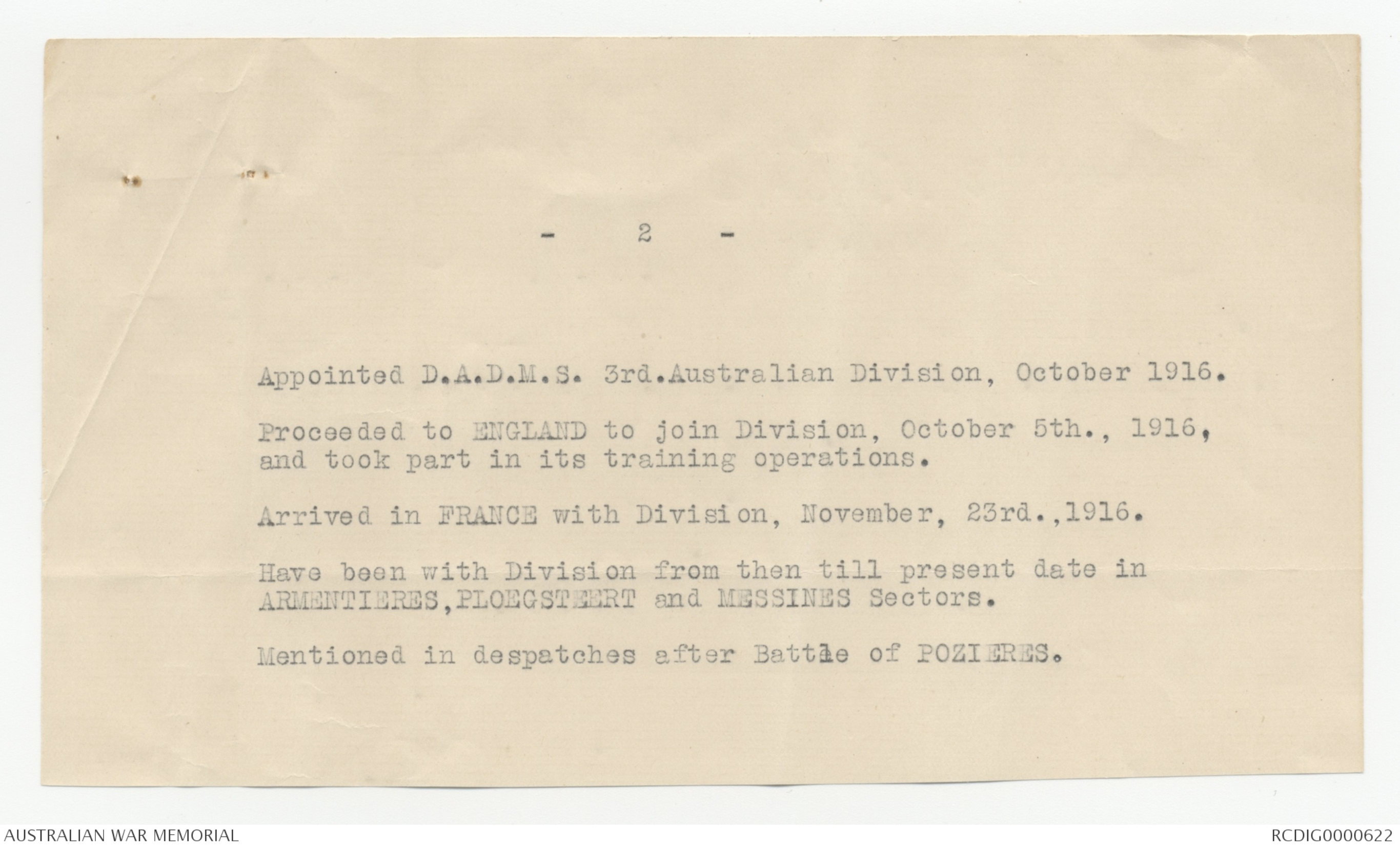
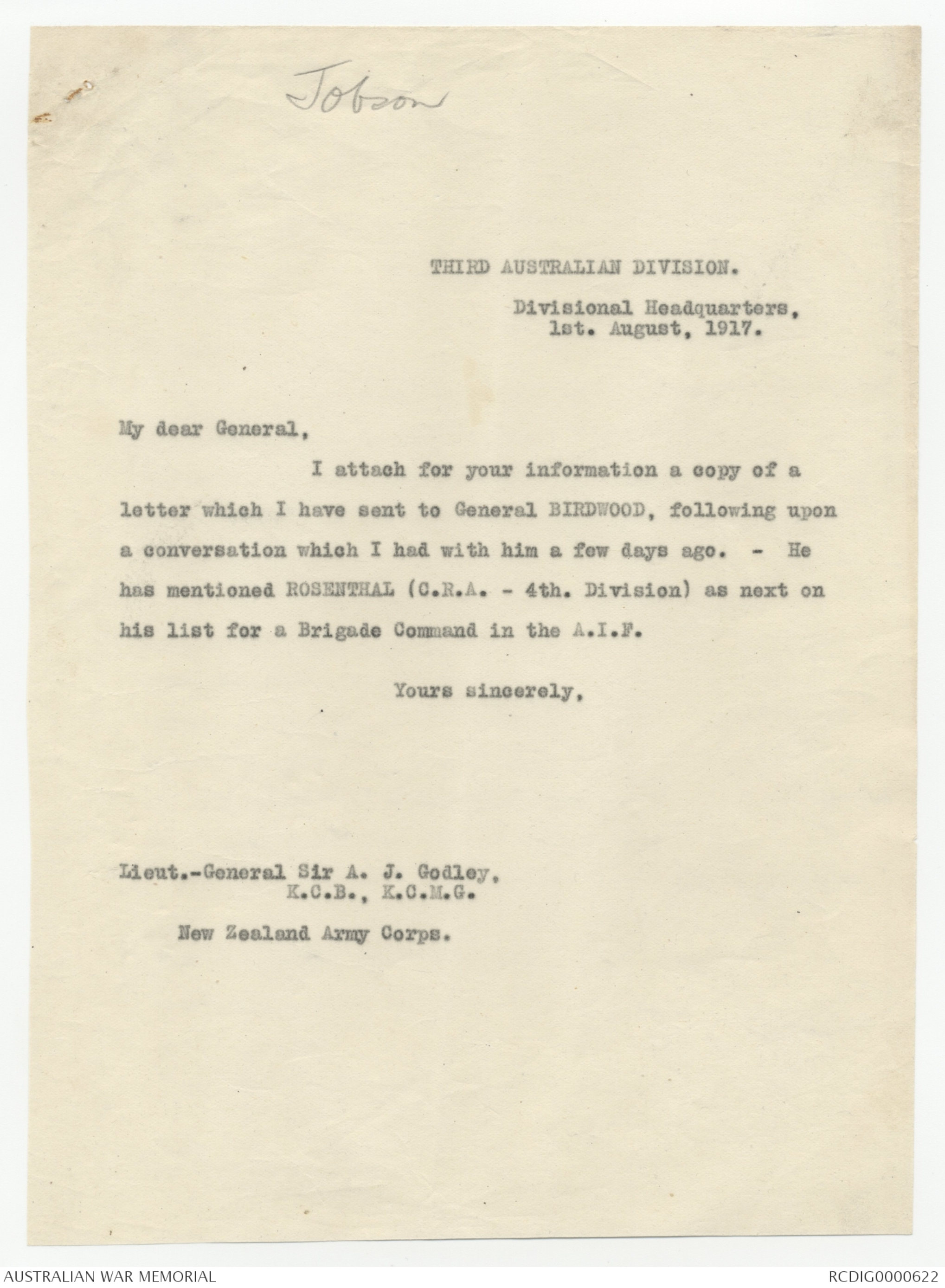
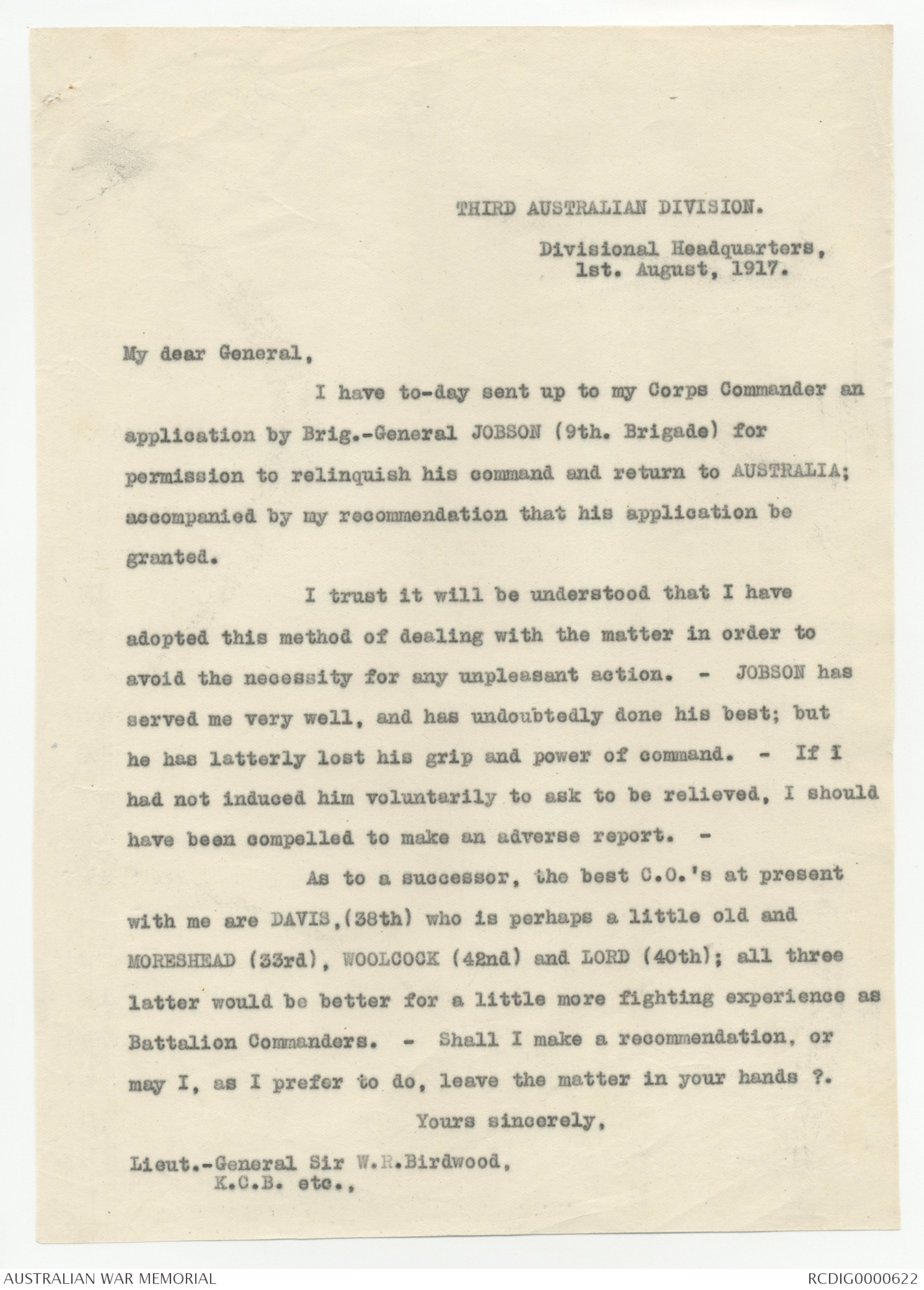
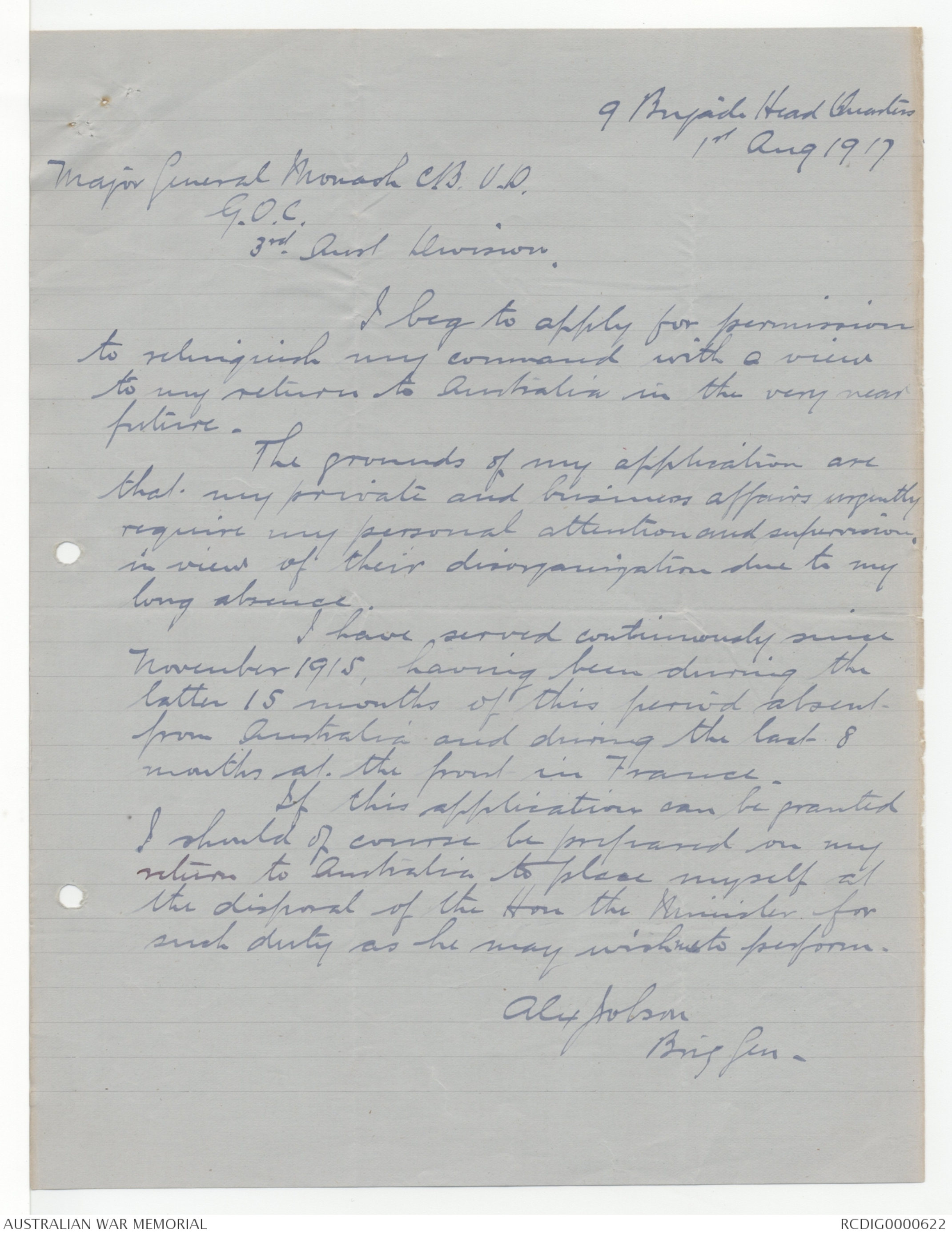

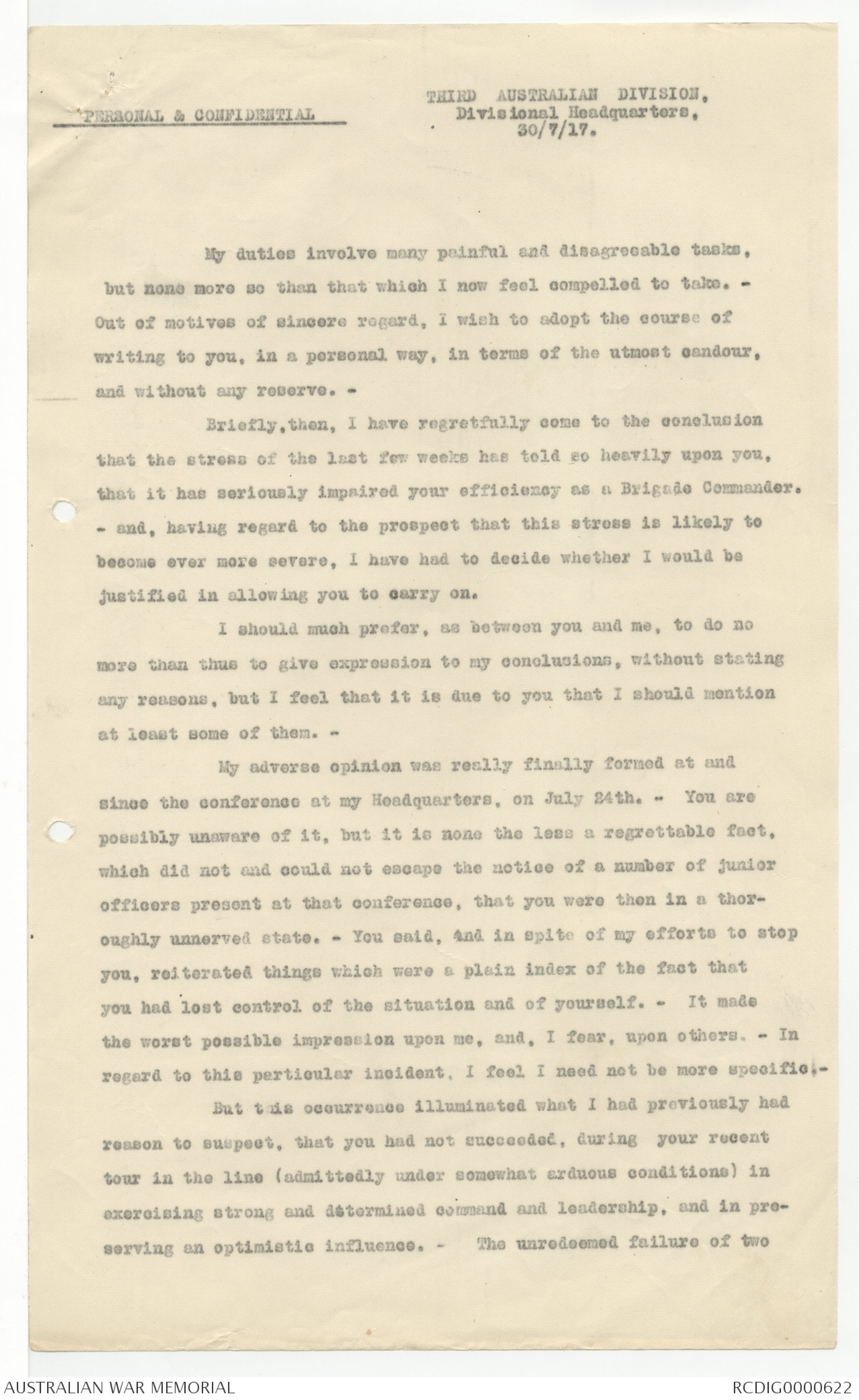
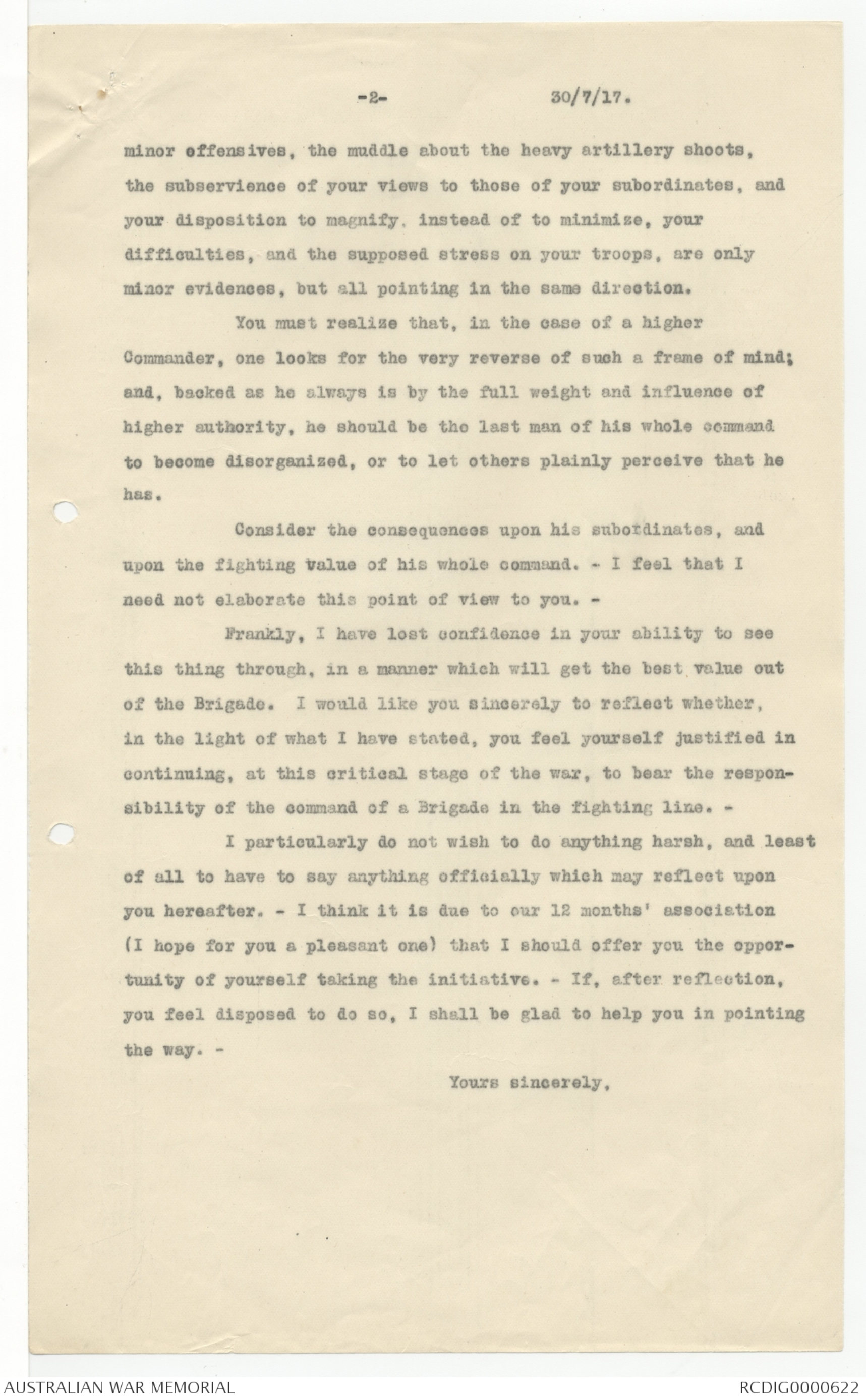
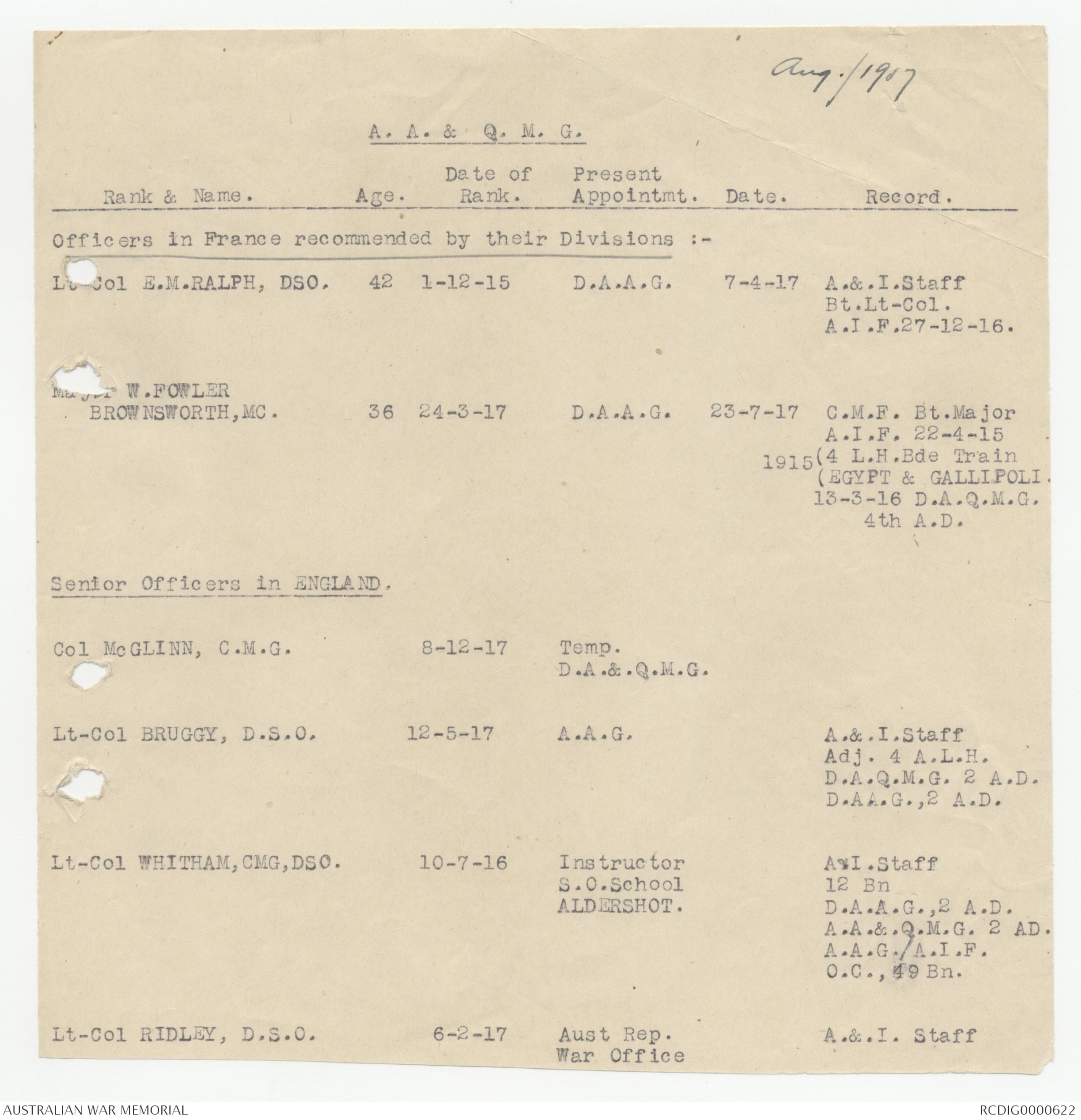
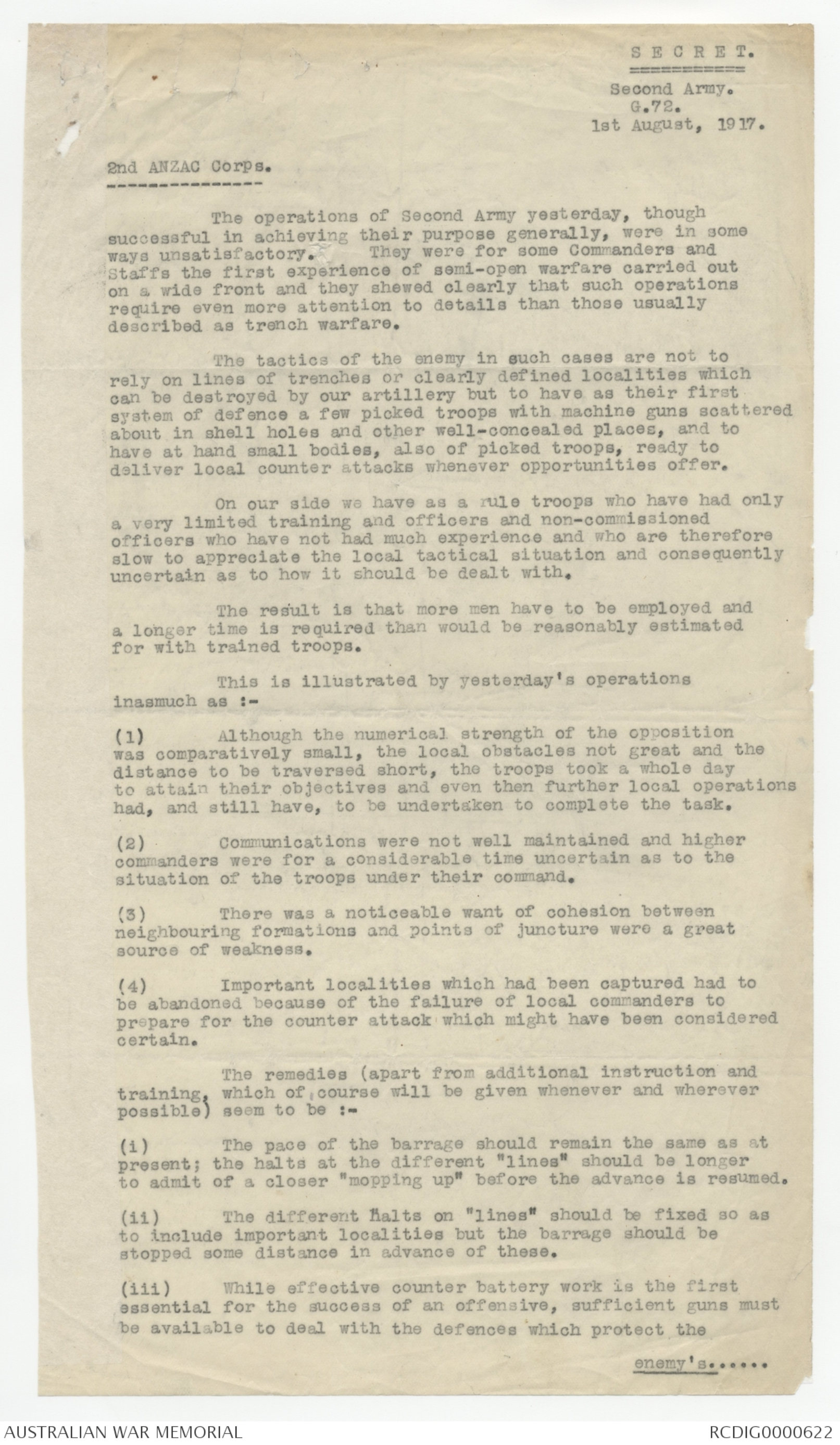
? 1/8/17
John H. Anderson.
D.A.D.M.S. 3rd Aus Div
Enlisted September 1914, as Captain A.A.M.C., being seconded from
16th.A.L.H. Regiment, C.M.F.
Medical Officer in charge Reinforcement Depot, BROADMEADOWS Camp.
Posted to 3rd.L.H.F.A., 3rd. Aust. L.H.Brigade, 2nd.October, 1914.
Formed Ambulance and acted as Adjutant.
Proceeded overseas January, 1915.
In EGYPT March and April, 1915.
Proceeded with 3rd.L.H.F.A. to ANZAC, May 1915.
Did duty in various capacities at ANZAC and LEMNOS from May to
October, 1915.
Unit was attached to 4th.Australian Infantry Brigade for August
operations.
Invalided sick from ANZAC, October 1915.
Patient in various hospitals for three months.
Re-joined Unit in EGYPT, February, 1916.
Proceeded to Canal Zone with Unit 11th.February, 1916.
Promoted Major 25th.February, 1916.
Transferred to 7th.Australian Field Ambulance, 2nd.Australian Division,
March 7th., 1916., and was given command of a Section.
Landed in France, March 19th., 1916.
Ambulance went into line end of March, 1916.
Did duty at A.D.S. and M.D.S.
Appointed Divisional Gas Officer, 2nd. May, 1916.
Inaugurated and organised Gas services of 2nd.Australian Division and
conducted schools, demonstrations, etc. in ARMENTIERES and MESSINES
Sectors.
Moved to SOMME with 2nd.Australian Division July, 1916.
Acted as Medical Officer in various capacities during fighting,
before and after battle of POZIERES, from Medical Officer in charge
of evacuations from R.A.P's to Medical Officer of a Corps Rest
Station.
Conducted Gas Schools and demonstrations when Division was out of line.
Was relieved of duties as Divisional Gas Officer under orders from
A.I.F.Headquarters, that combatant Officers only were to be so
employed.
Proceeded to YPRES Sector with 2nd.Australian Division, September 1916.
Carried out various duties as Medical Officer.
-2-
Appointed D.A.D.M.S. 3rd.Australian Division, October 1916.
Proceeded to ENGLAND to join Division, October 5th., 1916,
and took part in its training operations.
Arrived in FRANCE with Division, November, 23rd.,1916.
Have been with Division from then till present date in
ARMENTIERES, PLOEGSTEERT and MESSINES Sectors.
Mentioned in despatches after Battle of POZIERES.
Jobson
THIRD AUSTRALIAN DIVISION.
Divisional Headquarters,
1st. August, 1917.
My dear General,
I attach for your information a copy of a
letter which I have sent to General BIRDWOOD, following upon
a conversation which I had with him a few days ago. - He
has mentioned ROSENTHAL (C.R.A. - 4th. Division) as next on
his list for a Brigade Command in the A.I.F.
Yours sincerely,
Lieut.-General Sir A. J. Godley,
K.C.B., K.C.M.G.
New Zealand Army Corps.
THIRD AUSTRALLAN DIVISION.
Divisional Headquarters,
1st. August, 1917.
My dear General,
I have to-day sent up to my Corps Commander an
application by Brig.-General JOBSON (9th. Brigade) for
permission to relinquish his command and return to AUSTRALIA;
accompanied by my recommendation that his application be
granted.
I trust it will be understood that I have
adopted this method of dealing with the matter in order to
avoid the necessity for any unpleasant action. - JOBSON has
served me very well, and has undoubtedly done his best; but
he has latterly lost his grip and power of command. - If I
had not induced him voluntarily to ask to be relieved, I should
have been compelled to make an adverse report. -
As to a successor, the best C.O.'s at present
with me are DAVIS,(38th) who is perhaps a little old and
MORESHEAD (33rd), WOOLCOCK (42nd) and LORD (40th); all three
latter would be better for a little more fighting experience as
Battalion Commanders. - Shall I make a recommendation, or
may I, as I prefer to do, leave the matter in your hands ?.
Yours sincerely,
Lieut.-General Sir W.R.Birdwood,
K.C.B. etc.,
9 Brigade Head Quarters
1stAug 1917
Major General Monash CB. V.D.
G.O.C.
3rd Aust Division,
I beg to apply for permission
to relinquish my command with a view
to my return to Australia in the very near
future.
The grounds of my application are
that my private and business affairs urgently
require my personal attention and supervision,
in view of their disorganization due to my
long absence.
I have served continuously since
November 1915, having been during the
latter 15 months of this period absent
from Australia and during the last 8
months at the front in France.
If this application can be granted
I should of course be prepared on my
return to Australia to place myself at
the disposal of the Hon the Minister for
such duty as he may wish me to perform.
Alex Jobson
Brig Gen.
CONFIDENTIAL.
THIRD AUSTRALIAN DIVISION.
Divisional Headquarters,
1st. August, 1917.
Headquarters,
2nd. A. & N. Z. Army Corps.
I forward herewith an application per Brigadier-General
JOBSON, Commanding the 9th. Australian Infantry Brigade, for
permission to relinquish his command with a view to his return
to AUSTRALLA.
I recommend that this application be granted.
Major.-General.
Commanding Third Australian Division.
PERSONAL & CONFIDENTIAL
THIRD AUSTRALIAN DIVISION,
Divisional Headquarters,
30/7/17.
My duties involve many painful and disagreeable tasks,
but none more so than that which I now feel compelled to take. -
Out of motives of sincere regard, I wish to adopt the course of
writing to you, in a personal way, in terms of the utmost candour,
and without any reserve. -
Briefly,then, I have regretfully come to the conclusion
that the stress of the last few weeks has told so heavily upon you,
that it has seriously impaired your efficiency as a Brigade Commander.
- and, having regard to the prospect that this stress is likely to
become ever more severe, I have had to decide whether I would be
justified in allowing you to carry on.
I should much prefer, as between you and me, to do no
more than thus to give expression to my conclusions, without stating
any reasons, but I feel that it is due to you that I should mention
at least some of them. -
My adverse opinion was really finally formed at and
since the conference at my Headquarters, on July 24th. - You are
possibly unaware of it, but it is none the less a regrettable fact,
which did not and could not escape the notice of a number of junior
officers present at that conference, that you were then in a thoroughly
unnerved state. - You said, and in spite of my efforts to stop
you, reiterated things which were a plain index of the fact that
you had lost control of the situation and of yourself. - It made
the worst possible impression upon me, and, I fear, upon others. - In
regard to this particular incident, I feel I need not be more specific.-
But this occurrence illuminated what I had previously had
reason to suspect, that you had not succeeded, during your recent
tour in the line (admittedly under somewhat arduous conditions) in
exercising strong and determined command and leadership, and in preserving
an optimistic influence. - The unredeemed failure of two
-2- 30/7/17.
minor offensives, the muddle about the heavy artillery shoots,
the subservience of your views to those of your subordinates, and
your disposition to magnify, instead of to minimise, your
difficulties, and the supposed stress on your troops, are only
minor evidences, but all pointing in the same direction.
You must realize that, in the case of a higher
Commander, one looks for the very reverse of such a frame of mind;
and, backed as he always is by the full weight and influence of
higher authority, he should be the last man of his whole command
to become disorganized, or to let others plainly perceive that he
has.
Consider the consequences upon his subordinates, and
upon the fighting value of his whole command. - I feel that I
need not elaborate this point of view to you. -
Frankly, I have lost confidence in your ability to see
this thing through, in a manner which will get the best value out
of the Brigade. I would like you sincerely to reflect whether,
in the light of what I have stated, you feel yourself justified in
continuing, at this critical stage of the war, to bear the responsibility
of the command of a Brigade in the fighting line. -
I particularly do not wish to do anything harsh, and least
of all to have to say anything officially which may reflect upon
you hereafter. - I think it is due to our 12 months' association
(I hope for you a pleasant one) that I should offer you the opportunity
of yourself taking the initiative. - If, after reflection,
you feel disposed to do so, I shall be glad to help you in pointing
the way. -
Yours sincerely,
Aug./1917
A. A. & Q. M. G.
Rank & Name. |
Age. |
Date of Rank. |
Present Appointmt. |
Date. |
Record. |
| Officers in France recommended by their Divisions :- | |||||
| Lt Col E.M.RALPH, DSO. | 42 | 1-12-15 | D.A.A.G. | 7-4-17 |
A.&.I. Staff Bt.Lt-Col. A.I.F.27-12-16. |
|
Major W.FOWLER BROWNSWORTH, MC.
|
36
|
24-3-17
|
D.A.A.G.
|
23-7-17
|
C.M.F Bt.Major A.I.F. 22-4-15 1915(4 L.H.Bde Train (EGYPT & GALLIPOLI. 13-3-16 D.A.Q.M.G. 4th A.D. |
| Senior Officers in ENGLAND. | |||||
| Col McGLINN, C.M.G. | 8-12-17 |
Temp. D.A.&.Q.M.G. |
|||
|
Lt-Col BRUGGY, D.S.O.
|
12-5-17
|
A.A.G.
|
A.&.I.Staff Adj. 4 A.L.H. D.A.Q.M.G. 2 A.D. D.A.A.G.,2 A.D. |
||
|
Lt-Col WHITHAM, CMG,DSO.
|
10-7-16
|
Instructor ALDERSHOT.
|
A&I.Staff 12 Bn D.A.A.G.,2 A.D, A.A.&.Q.M.G. 2 AD. A.A.G./A.I.F. O.C., 49 Bn. |
||
|
Lt-Col RIDLEY, D.S.O.
|
6-2-17
|
Aust Rep. War Office |
A.&.I. Staff
|
||
SECRET.
Second Army.
G.72.
1st August, 1917.
2nd ANZAC Corps.
The operations of Second Army yesterday, though
successful in achieving their purpose generally, were in some
ways unsatisfactory. They were for some Commanders and
Staffs the first experience of semi-open warfare carried out
on a wide front and they shewed clearly that such operations
require even more attention to details than those usually
described as trench warfare.
The tactics of the enemy in such cases are not to
rely on lines of trenches or clearly defined localities which
can be destroyed by our artillery but to have as their first
system of defence a few picked troops with machine guns scattered
about in shell holes and other well-concealed places, and to
have at hand small bodies, also of picked troops, ready to
deliver local counter attacks whenever opportunities offer.
On our side we have as a rule troops who have had only
a very limited training and officers and non-commissioned
officers who have not had much experience and who are therefore
slow to appreciate the local tactical situation and consequently
uncertain as to how it should be dealt with.
The result is that more men have to be employed and
a longer time is required than would be reasonably estimated
for with trained troops.
This is illustrated by yesterday's operations
inasmuch as :-
(1) Although the numerical strength of the opposition
was comparatively small, the local obstacles not great and the
distance to be traversed short, the troops took a whole day
to attain their objectives and even then further local operations
had, and still have, to be undertaken to complete the task.
(2) Communications were not well maintained and higher
commanders were for a considerable time uncertain as to the
situation of the troops under their command.
(3) There was a noticeable want of cohesion between
neighbouring formations and points of juncture were a great
source of weakness.
(4) Important localities which had been captured had to
be abandoned because of the failure of local commanders to
prepare for the counter attack which might have been considered
certain.
The remedies (apart from additional instruction and
training, which of course will be given whenever and wherever
possible) seem to be :-
(i) The pace of the barrage should remain the same as at
present; the halts at the different "lines" should be longer
to admit of a closer "mopping up" before the advance is resumed.
(ii) The different halts on "lines" should be fixed so as
to include important localities but the barrage should be
stopped some distance in advance of these.
(iii) While effective counter battery work is the first
essential for the success of an offensive, sufficient guns must
be available to deal with the defences which protect the
enemy's. . . . . .
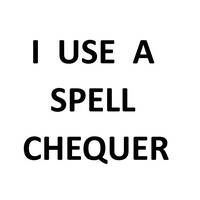 Not Yet Replaced By AI
Not Yet Replaced By AIThis transcription item is now locked to you for editing. To release the lock either Save your changes or Cancel.
This lock will be automatically released after 60 minutes of inactivity.